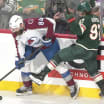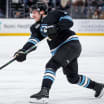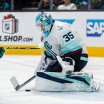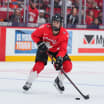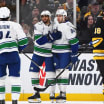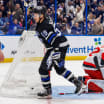BOCA RATON, Fla. -- Goalie equipment was the topic of the day Tuesday at the NHL General Managers meetings, but there were other interesting discussions, tidbits of information, news and notes.
Here are five things we learned Tuesday:
GMs consider changes to power play
Meetings focused on ways to increase scoring
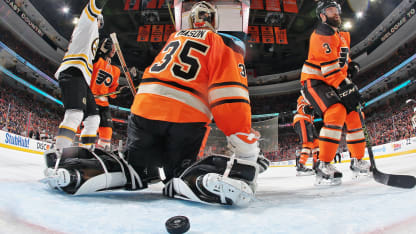
© Len Redkoles/Getty Images
1. GMs talking about other ways to increase scoring
The GMs are hopeful the contoured goalie equipment expected to come into the League as early as next season will create more goals. But it's not stopping some of them from discussing other ways to increase scoring, or at least increase scoring chances.
One of the breakout groups Tuesday discussed more radical changes, including calling icing on the team killing a penalty; allowing the power play to continue for a full two minutes regardless if a goal is scored; and putting a time limit on how long a player can hold the puck behind the net before he has to move it.
"These are things that were brought up today that I need to think more about, and the whole group has to hear them anyway," Buffalo Sabres GM Tim Murray said. "But at least we're talking to try and figure out ways to create more scoring and more offense."
Murray said a drawback to calling icing on the penalty-killing team is how it would lengthen the games, but the pro is that it would create a faceoff opportunity in the offensive zone for the team on the power play, negating the need for a zone entry, which he said is the most difficult aspect of the power play.
Murray said it's difficult to enforce rules against a forecheck because that's based on systems play, but perhaps having a rule that limits the time a player can spend in the trapezoid or behind the goal line with the puck could create more forechecking and more chances for turnovers that lead to scoring chances. He likened it to the three-second rule in basketball.
However, it might be difficult for Murray and other proponents of such rules, including Montreal Canadiens GM Marc Bergevin, to get enough GMs on board to make these possible. For example, Doug Armstrong of the St. Louis Blues and Jim Nill of the Dallas Stars each said he was opposed to big changes before seeing the impact of the smaller goalie equipment.
2. Rangers GM unsure of Yandle's future
New York Rangers GM Jeff Gorton said he hasn't talked with defenseman Keith Yandle's agent, Jerry Buckley, "in a while," fueling speculation that Yandle will not be back with the Rangers after this season. Yandle, who can become an unrestricted free agent on July 1, leads the Rangers with 35 assists and is third with 40 points.
"[Yandle] loves New York, we love him, but if you look at our salary cap, we have a lot of issues we're going to need to work out, like a lot of teams," Gorton said.
The Rangers have $18.8 million committed to defensemen Dan Girardi, Ryan McDonagh, Marc Staal and Kevin Klein for the next two seasons, according to GeneralFanager.com. Dylan McIlrath can become a restricted free agent.
The Rangers also have prospect Brady Skjei, who is close to being NHL ready. Skjei, like Yandle, is a left-handed puck-moving defenseman, but he's 21 and on an entry-level contract.
"You need good players that are coming that don't make a lot of money," Gorton said. "Brady looks on the cusp of being an NHL player. I think that will help our decision."
3. Impact of new goalie equipment
The GMs hope a byproduct of the new goalie equipment proposals will be a greater separation between the best goaltenders and the ones who get by because of the size of their pads. The buzz word they used was "athleticism."
"The athletic goalies will be rewarded more than the shot-blockers," Armstrong said.
Armstrong said goalie is now a "big man's position," which is why the GMs think athletic big goalies, such as Pekka Rinne of the Nashville Predators, won't be affected greatly by the change in pads. Anderson also said he wondered if smaller goalies will benefit from smaller equipment because it will give them the ability to showcase their athleticism.
4. GMs haven't talked expansion draft or draft lottery
Two topics that are of keen interest to all the general managers -- the rules for a potential expansion draft, and ideas for possible radical changes to the NHL Draft lottery -- have not been broached at these meetings. The GMs hope to discuss them before leaving Wednesday.
Ears will perk if the NHL gives a rough outline of potential expansion-draft rules to the GMs because they want to know how many players they would have to leave open to be drafted and if they would have to protect players with no-trade and/or no-move clauses in their contracts.
Some GMs said they believe they will be forced to protect players with no-trade or no-move clauses because of the terms of the contracts. One GM wondered if a player with a no-trade clause could be left unprotected if he would normally be able to be waived, whereas the players with no-move clauses can't be sent anywhere without approval.
"I'm concerned about the Florida Panthers," GM Dale Tallon said. "I want to make sure that I can protect what we have built up here. It's taken long, hard hours. We see a bright future. I don't want that taken away from us."
The draft lottery is also of interest because some GMs want to discuss the idea of limiting the number of times a team would be eligible to win the No. 1 pick.
5. Sather honored by fellow GMs
The GMs' tradition of honoring their own continued Monday at a dinner for New York Rangers president Glen Sather. Sather was Rangers general manager from 2000 through last season before ceding the position to Gorton.
"He reminds me every day he's not out of it," Gorton said jokingly.
Gorton said the best part of the dinner was listening to Sather and some of his closest friends in the business, Bill Torrey, Bob Pulford and Harry Sinden, tell jokes and make fun of each other throughout the night.
"Obviously he's a special guy who has accomplished a lot in the game," Gorton said. "Everybody has an appreciation for him."




